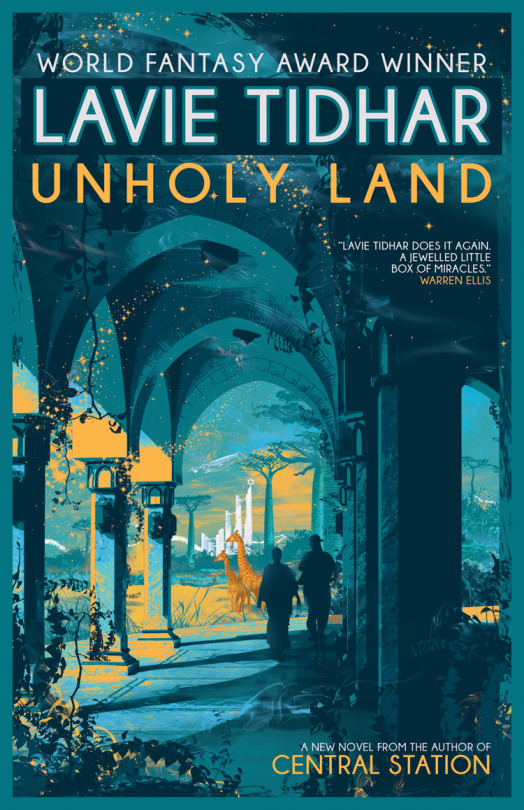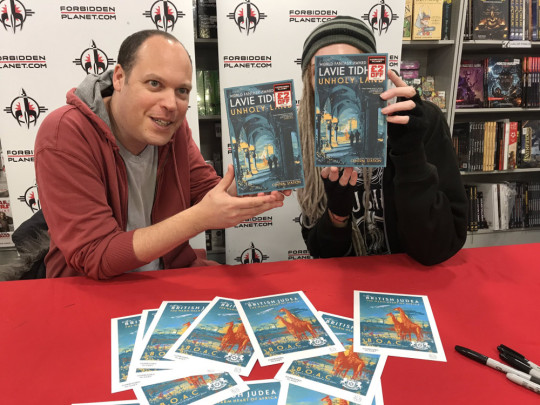Really quite terrific, Lavie Tidhar’s suspenseful UNHOLY LAND provides a complex meditation on the possible paths of modern Jewish history
Reviews keep flooding in for Lavie Tidhar’s fascinating UNHOLY LAND.

In INTERZONE (278 NOV-DEC), Andy Cox praises the novel.
This is really quite terrific. The story of the missing woman is intriguing, a proper detective novel plot, while the reality-shifting elements play an important role and reach an astonishing apotheosis towards the end in a sequence that puts Lovecraft to shame. It’s another Lavie Tidhar book that is full of ideas and unafraid to tackle big, controversial, important issues. Warren Ellis compares him to Michael Moorcock in an afterword, and like Moorcock, Tidhar writes books that are unpredictable and experimental, consistently and reliably surprising, yet always readable and engaging. UNHOLY LAND is another corker.
Gary K. Wolfe for CHICAGO TRIBUNE lauds the work.
Here, in UNHOLY LAND, he turns his attention to his own homeland, in a scenario that seems wildly unlikely until we realize it was actually proposed in the early 20th century: namely, relocating European Jews to part of what is now Uganda. When pulp writer Tirosh returns to his home in “Palestina,” he learns that his niece has disappeared while researching the early history of the country. While this mystery provides the spine of the plot, we also meet an ominous investigator following Tirosh for his own reasons and a historian working for a shadowy Border Agency, whose job is to monitor various timelines. By the time their stories all braid together, Tidhar has turned a suspenseful adventure tale into a complex meditation on the possible paths of modern Jewish history.
At SFREVU, Benjamin Wald enjoys the book.
Tidhar goes out of his way to make this clear; for example, Palestina is in the process of building a massive wall to separate themselves from their neighbors; a clear reference to both Trump and to the existing “security fence” between Isreal and the West Bank. Using Palestina to talk about Israel is a remarkably effective tool. Having the displaced peoples be Africans instead of Palestinians short-circuits many of the assumptions and habits of thinking about the conflict, or at least it did for me. Opinions on Israel are in many cases so entrenched that fantasy can be the most effective way of approaching them. This wouldn’t work if Tidhar has made Palestina a cardboard villain or crude satire of Israel. Instead, Tidhar paints a rich vibrant land, inhabited by real people. But none of this can conceal the violence on which it is founded.
That on its own would make UNHOLY LAND a fascinating work. But, this being Lavie Tidhar, alternate history is not enough. He also builds a whole network of alternate worlds, built around the kabbalistic idea of the tree of the Sephiroth. And some people, either accidentally or intentionally, can move between these worlds. Tirosh himself, it turns out, has unbeknownst to him slipped into Palestina from an alternate world. And someone is trying to tear down the walls between the worlds, with disastrous consequences.
As well as making for a gripping story, complete with trans-world agents tasked with preserving the Sephiroth, this conception allows Tidhar to even more explicitly consider the historical accidents that lead to the creation of Israel, and to consider the reaction of those from Palestina to our own Isreal.
Suncerae Smith on READ WELL reviews it.
I love the slow, surreal unraveling of UNHOLY LAND, both in terms of plot and genre. Without quite realizing it himself, Lior transitions from writer to detective, from an uneventful life to one filled with murder and intrigue, narrowly escaping multiple factions who want him dead. Then, it’s not just Lior’s memories that slip away, but reality itself, as Lior finds he can travel through alternate realities.
<snip>
At first blush the plot seems over-the-top and action-packed, and it is at times. But at its heart, the novel is slow and subtle and abstract and unnerving.

Lavie Tidhar and cover artist Sarah Anne Langton at Forbidden Planet (photo: Jon Harrison via Twitter)
In a FORBIDDEN PLANET blog interview, Tidhar talks type, time travel and clowns.
Can you tell us a bit about your latest novel, UNHOLY LAND?
I think of it as the last of that loose sequence of weird novels I’ve been writing since Osama. It’s an alternate histories-noir detective-metafictional-political thing (what Adam Roberts I think started to call “Tidharian”!). It’s about a guy called Lior Tirosh, who time-slips into an alternate history world where Jews settled in what was then British East Africa (based on a real historical offer from 1904!) and then things slowly get much weirder. Along the way he starts thinking he’s a hardoiled detective from one of his own novels, and there are people after him, and it turns out there’s more than one reality at play. It’s both sort of very playful and very serious at the same time – I can’t seem to help myself in that I like doing the political stuff, but there has to be some sort of cheap gags thrown in too!
<snip>
Can you tell us what you’re working on next?
The next book that’s going to be published in The Circumference of the World, which is sort of about God and science fiction. It’s sort of like, what if this 60s writer came up with a ridiculous theory about the nature of the universe – but it might just be that he was right about everything? It’s sort of a bibliomystery and it plays with a lot of different literary styles and voices. I suspect I may have been a little too ambitious with it! We’re still editing it…
But like I said, moving on, I am working on something very different, my first epic (in the sense of, it’s LONG!) novel, a sort of historical fantasy novel. But this being me it still has a lot of very ridiculous stuff in it, and it also addresses some pertinent political issues and so on. But there are swords! And I think there’s even a dragon at some point! A DRAGON! And it’s surprisingly fun to do, I’m having a blast with it.
For more info on UNHOLY LAND, visit the Tachyon page.
Cover by Sarah Anne Langton
